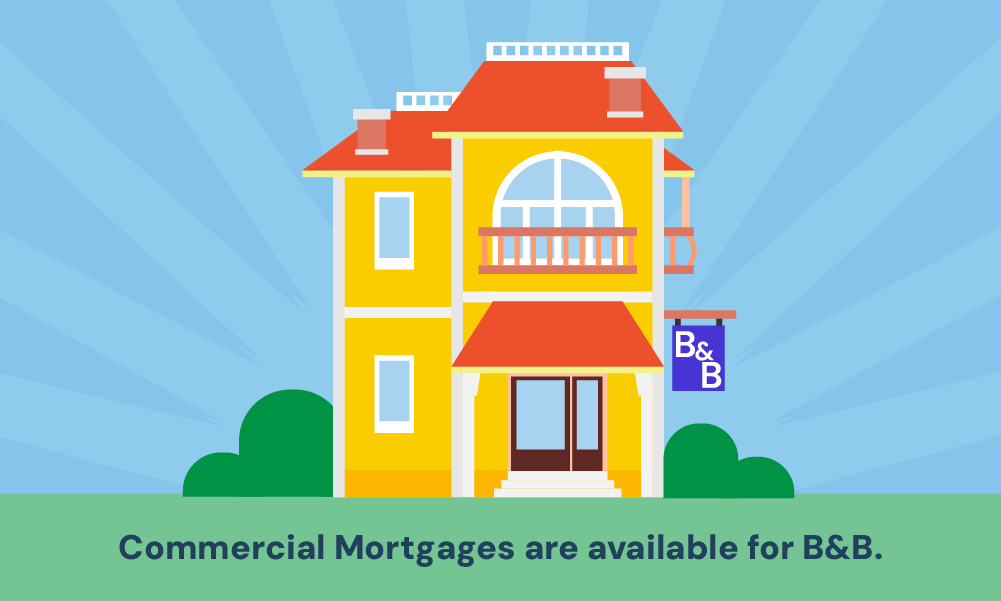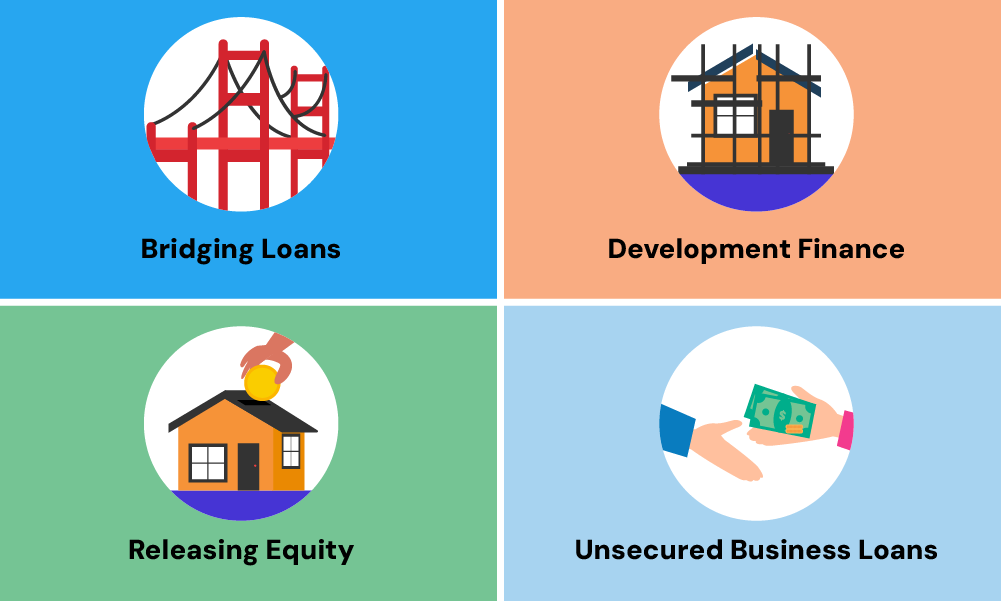- Can I Get a Mortgage for a Bed and Breakfast Business?
- What Are the Eligibility Criteria for a B&B Mortgage?
- How Much Can I Borrow?
- How to Secure a B&B Mortgage in the UK?
- Which Lenders Offer B&B Mortgages?
- Should I Get a Guesthouse Mortgage?
- What Are Your Alternatives to a Traditional B&B Mortgage?
- The Bottom Line
What Are Bed And Breakfast Mortgages In The UK? A Guide

Running a bed and breakfast can be a lucrative venture, especially in the UK’s tourist spots. Plus, you’ll have the chance to meet truly interesting people.
But let’s be honest: starting a B&B is not cheap. You need to invest in creating a place that guests will love.
That’s why getting it right from the start is crucial, especially when it comes to funding.
For that, we’ve got you covered.
This guide will help you understand all about B&B mortgages, so you can start your own bed and breakfast the right way.
Can I Get a Mortgage for a Bed and Breakfast Business?
Yes, you can.
In the UK, if you’re looking to buy, improve, or refinance a bed and breakfast, you’ll likely need a commercial mortgage. These are designed for business purposes and differ from residential mortgages.
To get one, it’s important to show a solid business plan to lenders, including how you’ll attract guests and manage your finances.
But, there are exceptions about how much of your property is used for residential versus commercial purposes.
If most of your B&B is for guests (more than 40%), you might lean towards a commercial mortgage.
However, if you live in a significant part of the B&B, a residential mortgage could be more up your alley.
There’s also a semi-commercial mortgage option, which is a mix of both, perfect for properties that don’t fit neatly into one category. These mortgages come with their own set of rules and rates.

What Are the Eligibility Criteria for a B&B Mortgage?
When it comes to securing a B&B mortgage, lenders have a checklist to see if you make the cut.
Here’s what they’re looking for:
- Hospitality Experience. Having a background in hospitality or running a similar business can significantly sway the decision in your favour. It shows lenders you have the skills to make your B&B successful.
- A Comprehensive Business Plan. This is your B&B’s roadmap, detailing everything from marketing strategies to financial forecasts. A strong plan reassures lenders that you’ve thought through how to make your B&B thrive and pay back the mortgage.
- Deposit Requirements. You’ll usually need a substantial deposit, often between 20%-40% of the property’s value. The exact amount can vary based on the lender and your financial situation.
- Personal Finances. Lenders will take a close look at your financial health, including income and assets, to gauge your ability to support the mortgage alongside business operations.
- Credit History. A good credit score can make a big difference. It not only affects your eligibility but also the interest rates you’re offered. Even if your score isn’t perfect, some lenders specialise in helping those with less-than-ideal credit.
How Much Can I Borrow?
The answer isn’t one-size-fits-all but depends on several things.
Lenders look at your income, the guesthouse income or potential income, and your deposit size.
Firstly, your personal financial situation matters. Lenders want to see that you can handle the loan, especially during off-seasons when the B&B might not bring in as much money.
The B&B’s proven income or potential income is also key. If it’s already up and running, lenders will look at how much it earns to figure out how much they can lend you.
For new ventures, a solid business plan showing expected earnings can help.
How much deposit you have is important. The more money you can put down initially, the more you might be able to borrow. It also shows lenders you’re serious and have skin in the game.
But, remember, each lender has its own rules on how much they’ll lend. Some might offer you more money than others.
A chat with a mortgage advisor can give you a clearer picture of your unique situation.
But in the meantime, try the commercial mortgage calculator below to see an initial estimate of your borrowing amount.
[Embedded Commercial Mortgage Calculator]
How to Secure a B&B Mortgage in the UK?
Ready to take the leap and secure a mortgage for your B&B dream?
Here’s a step-by-step guide to make the process smoother:
1. Gather Your Documents
Start with the basics like your ID, proof of income, and details about your finances. But for a B&B mortgage, you’ll also need to show your business plan and, if you have it, evidence of your experience in hospitality.
2. Showcase Your Hospitality Experience
If you’ve worked in or run a similar business before, make sure to highlight this. It tells lenders you know what you’re doing and can handle running a B&B.
3. Prepare a Strong Business Plan
This is crucial. Your plan should cover how you’ll make the B&B profitable. Include details on marketing, management, and financial projections.
The clearer your plan, the more confidence lenders will have in you.
4. Find the Right Lender
Not all lenders are the same. Some might be more open to funding B&B projects than others. Doing your homework to find a lender that matches your needs can pay off.
5. Make Your Case
When you apply, be ready to explain why you’re a good bet.
Highlight your strengths, from your business plan to your experience. The goal is to convince the lender that you’re worth the investment.
Looking for an easy way? Speak with a commercial mortgage advisor. They can help you provide tailored advice, compare options, and get you the best deal for your business.

Which Lenders Offer B&B Mortgages?
Since guest houses or B&Bs are commercial options, you’ll likely need to explore commercial mortgage options. Here are some lenders who offer commercial mortgages:
- ABC Finance
- Lloyds Bank, NatWest
- HSBC
- Barclays
- Assetz Capital
- Allica
Finding the right lender means looking at what they offer and matching it to your needs. Consider things like interest rates, loan terms, and how much they understand the B&B industry.
>> More about Commercial Mortgage Lenders
Should I Get a Guesthouse Mortgage?
Before you dive in, it’s important to consider if the benefits outweigh the costs. To help you find out, let’s look at the pros and cons of getting a B&B mortgage.
Pros
– You can turn a property into a profitable business, welcoming guests and creating memorable experiences.
– It might be easier to get a mortgage for a business that already has a good track record of guests and income.
– Owning a B&B can increase your property’s value over time, especially if you’re in a popular area.
– You get to be your own boss, running things your way and meeting new people from all over.
Cons
– Starting up can be pricey. You’ll need a sizable deposit and possibly money for updates or marketing.
– Interest rates for commercial mortgages, like those for B&Bs, are usually higher than for a regular home loan.
– Running a B&B is hard work. You’re always on call, and there’s a lot of behind-the-scenes stuff to handle.
– The income can be up and down, depending on the season, which might make budgeting tricky.
Overall, the decision depends on how these points fit into your unique situation.
If you’re ready for the challenge and excited by the idea, it could be a great move. But if the cons have you thinking twice, it might be worth exploring other options or waiting until you’re more prepared.
What Are Your Alternatives to a Traditional B&B Mortgage?
If a traditional B&B mortgage doesn’t seem right for you, there are other ways to finance your venture. Let’s look at a few:
- Bridging Loans – Quick to set up and perfect for short-term needs, like buying at an auction. However, they come with high-interest rates and are meant to be paid back quickly.
- Development Finance – Great for big renovations or building from scratch. You get the money in stages, which can help manage costs. But, you’ll need a clear plan on how to pay it back, often by getting a mortgage later.
- Releasing Equity – If you already own property, you might be able to use its value to fund your B&B. This can be a smart move, but remember, it puts your property at risk if things don’t go as planned.
- Unsecured Business Loans – These are good for smaller amounts and don’t require collateral. The downside? Higher interest rates and shorter repayment periods compared to secured loans.
Each option has its benefits and drawbacks. Your choice depends on your situation, how much you need to borrow, and how quickly you plan to repay it. Weighing the pros and cons carefully can help you pick the best path forward.

The Bottom Line
As a rule, never commit to a loan without understanding every term and how it benefits your business.
B&B mortgages are not just about signing papers, but a long-term commitment. You must really understand what you’re getting into before jumping into it.
You also need to have the right documents, a large deposit, a strong business plan, and some proof of hospitality experience.
Feeling overwhelmed? You don’t have to go alone. Teaming up with a commercial mortgage advisor can provide the clarity and support you need.
They can simplify the process, offer expert advice, and help you secure the ideal loan for your dream property.
Want to cut through the hassle? Reach out to us. We’ll match you with a perfect commercial mortgage advisor who knows your vision and helps you find the best deal for you.
Get Matched With Your Dream Mortgage Advisor...

Frequently asked questions
Can I get a B&B mortgage if I have no experience in hospitality?
While having hospitality experience can help, it’s not always a deal-breaker and not mandatory. If you lack direct experience, highlighting related skills and presenting a strong business plan can bolster your application.
Are there any specific insurance requirements for B&B mortgages?
Yes, lenders will usually require you to have comprehensive insurance coverage for your B&B. This includes property insurance, liability insurance, and sometimes business interruption insurance.
What happens if I struggle to make mortgage payments on my B&B?
It’s crucial to communicate with your lender as soon as possible. They may offer solutions like restructuring your payment plan. Ignoring the problem can lead to more serious financial issues.
Failure to meet monthly repayments can result in losing your property.
Can first-time buyers secure commercial mortgages?
You can get a commercial mortgage as a first-time buyer! While it might seem tricky, lenders care more about your business’s potential and repayment ability than your property experience.
To impress them, have a solid business plan, show financial stability, and consider a bigger down payment to manage risk.
Talking to a commercial mortgage broker can also boost your chances of getting approved.




